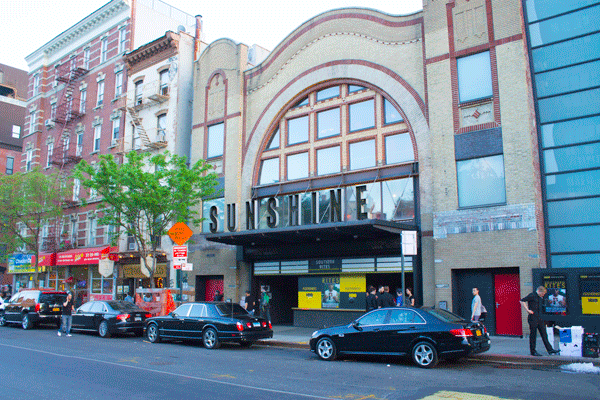
BY ZACH WILLIAMS | The Landmark Sunshine Cinema on E. Houston St. could become the latest victim of dual forces threatening movie theaters both locally and across the country.
All seemed normal on a Monday night earlier this month when the theater featured a closed screening for an HBO documentary. But behind the scenes, the owner of the building, which the theater leases, is looking to sell the property to real estate developers who are all too eager to find another spot for luxury redevelopment in the East Village and Lower East Side, The Real Deal reported on May 8.
Sources told that publication that the owner, Steven Goldman of S & G Houston Realty, wants $35 million for the property at 139-143 E. Houston St.
Efforts are currently underway to redevelop historic theaters in other boroughs. Files have been planned to convert Brooklyn’s Pavilion Theater, in Park Slope, into residences. Attempts have also been made to redevelop the landmarked RKO Keith’s Theater in Queens.
Goldman could not be reached for comment on the reported effort to sell the E. Houston St. building. While the building is historic, the site of an early movie theater, it is not a designated city landmark.
“We’re not privy to any of that,” Lauren Kleiman — a spokesperson for California-based Landmark Theatres, which owns the Sunshine Cinema — said in a telephone interview. She declined to provide details about whether the Lower East Side venue has struggled financially or whether it has been subject to steep rent increases like those experienced by other local businesses in recent years.
The cinema previously tried to boost revenues by obtaining a full liquor license but Community Board 3 only offered its support for a beer-and-wine license. Kleiman said, whether or not the building is sold, Landmark Theatres remains committed to keeping a presence in the neighborhood.
“We love the East Village,” she said. “We love being there and our customers, and we feel they feel the same way about us.”
The theater, which opened in 2001 and specializes in independent films, has cultivated a devoted clientele, according to reviews on Yelp.com, where it enjoys a 4.5 out of five stars from 274 reviews. Some reviewers noted the impressive refreshments menu while others said the comfy ambience, film offerings and general funkiness make the place particularly inviting.
Whether the theater survives current real estate pressures is not the only challenge it faces. Seung-Hoon Jeong, an assistant professor of Cinema Studies at New York University, said that the future is not particularly optimistic for Lower Manhattan movie theaters.
“If theaters can’t make enough money to survive in New York City,” he said, “they may disappear from Downtown and wander around the edge of the city like nomadic phantoms.”
The role of movie theaters in American culture has changed in recent decades, especially with the increase in home-entertainment options, including streaming video. According to the Motion Picture Association of America, while movie ticket prices have gone up, the number of tickets sold in the U.S. fell 11 percent between 2004 and 2013.
Movies once were made of physical material, but film in the future will be more of an information flow than an actual object, Jeong said. This further disperses the community of movie watchers from their previous places right next to each other in a physical space, he added.
There is hope, however, for true movie lovers who desire to return to the old ways in the future, according to Jeong.
“Though reduced in number, there are always cinephiles and people who just like to go to movie theaters, even alone, even occasionally,” he said. “I guess if the cinema as community is still wanted or needed, the city community would figure out how to protect it. If not, that’s the life of cinema.”

































